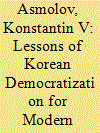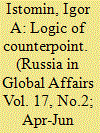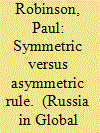| Srl | Item |
| 1 |
ID:
167777


|
|
|
|
|
| Summary/Abstract |
The article attempts to trace the evolution of the Chinese school of international relations and the influence that Qin Yaqing’s “relational theory of world politics” arising in its depths and claiming universality has on the formation and implementation of the diplomatic strategy of China’s partner relations. The process constructivism and normative requirements—the recognition by partner states of the core national interests of the PRC—act as a theoretical pattern in the article.
|
|
|
|
|
|
|
|
|
|
|
|
|
|
|
|
| 2 |
ID:
167776


|
|
|
|
|
| Summary/Abstract |
Russia, under the stewardship of Vladimir Putin, has arguably taken a number of steps to try and secure a position as a pole in an emerging multipolar world. One step has been to modernize its military and reassert itself globally (evident in its Syria action), while another step has been to try and hasten the decline of the United States (evident in its BRICS cheerleading). It is argued that the latter step is particularly difficult to achieve because the United States still has a significant power advantage over the rest.
|
|
|
|
|
|
|
|
|
|
|
|
|
|
|
|
| 3 |
ID:
167774


|
|
|
|
|
| Summary/Abstract |
The role of digital communication has been given a lot of credit and influence in its presumed power to bring about change in society, on a local or national or global level. When this presumed power for change or disruption is applied to the existing world order, there is a more nuanced outcome. In the current global order, the United States remains the unipolar hegemonic power. However, it is becoming visibly weakened, much of the harm coming from the results of its own foreign policy actions that are more guided by values and norms, rather than interest. Digital communication plays a role in both defending the current world order and challenging it. It is done in a way that renders the traditional restraints and constraints of geopolitics impotent by making space and time irrelevant, and by opening up the potential for creating global networks and relationships.
|
|
|
|
|
|
|
|
|
|
|
|
|
|
|
|
| 4 |
ID:
167779


|
|
|
| 5 |
ID:
167778


|
|
|
|
|
| Summary/Abstract |
Amid debates over democratic transition in Eastern Asia the South Korean case more often than not drops out of sight. Meanwhile, the fall of the Syngman Rhee regime and the unsuccessful democratic experiment of the Second Republic, the modernization of the country during Pak Chung-hee rule and the attempts at democratization during the military dictatorship of Chun Doo-hwan are of great illustrative value.
|
|
|
|
|
|
|
|
|
|
|
|
|
|
|
|
| 6 |
ID:
167769


|
|
|
|
|
| Summary/Abstract |
Since the 2000s, the drive towards normative hegemony of liberalism promoted by the United States has contributed to the consolidation of new alignments on the international arena. As it posed an ideological threat to other systems of rule, American policy prompted some states towards balance by encouraging them to strengthen cooperation between themselves. This pattern of behavior is typical of any political belief system claiming to provide universally applicable solutions for building political order in societies.
|
|
|
|
|
|
|
|
|
|
|
|
|
|
|
|
| 7 |
ID:
167772


|
|
|
|
|
| Summary/Abstract |
Most foreign and Russian international relations experts, regardless of their political leaning, seem to agree that the world has become unpredictable, uncertainty is increasing, this process cannot be influenced, and it would be better to step aside and do nothing.
|
|
|
|
|
|
|
|
|
|
|
|
|
|
|
|
| 8 |
ID:
167773


|
|
|
|
|
| Summary/Abstract |
This article overviews the phenomenon of private military and security companies (PMSCs) through the prism of various theoretical concepts. The paper explores the heterogeneous nature of PMSCs, the reasons for their present-day increased activity, and interaction with state and non-state participants in global processes. The phenomenon manifests itself amid the change in the attitude towards traditional forms of violence, which allows states to partly outsource their security and law-enforcement functions. At the same time, some countries maintain their monopoly on violence and are even expanding the arsenal of mechanisms for consolidating their geopolitical influence through PMSCs. The study shows that PMSCs’ activities in “weak” countries may impair the inviolability of their statehood. The article also discusses the possibility of democratic control of PMSCs’ activities
|
|
|
|
|
|
|
|
|
|
|
|
|
|
|
|
| 9 |
ID:
167770


|
|
|
|
|
| Summary/Abstract |
Conflicts between branches of government reflect growing conflicts within the public domain regardless of what political regime is at the helm. Society in general develops through conflicts arising from objective causes. A conflict within society is an objective phenomenon and therefore is inevitable. At the same time, conflicts take less time to mature and are more distinct in a democracy than in an autocracy, and thus, conflict management is normally more effective in a democratic setting
|
|
|
|
|
|
|
|
|
|
|
|
|
|
|
|
| 10 |
ID:
167771


|
|
|
|
|
| Summary/Abstract |
This article proposes that although both Russia and the West claim to support an international order founded on a mutually agreed set of rules, their views of that order are very different. For Russia it is a system in which the same set of rules applies to everybody, and which might therefore be termed “symmetric.” For the West, it is a system in which those deemed “just” have more rights than those deemed “unjust,” and which might therefore be termed “asymmetric.” Through an analysis of recent trends in just war theory, the article will show that the asymmetric Western view of the international order is a natural outcome not only of the West’s relative power but also of human rights doctrines. The supremacy of these doctrines is not, however, fully accepted by Russia. Overcoming Western-Russian tensions requires, among other things, that the two sides find a mutually acceptable view of the international order. The logic outlined in this article demonstrates, however, that this will be difficult to achieve
|
|
|
|
|
|
|
|
|
|
|
|
|
|
|
|
| 11 |
ID:
167775


|
|
|
|
|
| Summary/Abstract |
On April 11, 2019, London police arrested WikiLeaks founder Julian Assange at the Ecuadorian Embassy. He was denied further asylum. Today, the fuss caused by the publication of thousands of classified documents in the early 2010s is almost forgotten, but Assange has already entered the history of diplomacy
|
|
|
|
|
|
|
|
|
|
|
|
|
|
|
|